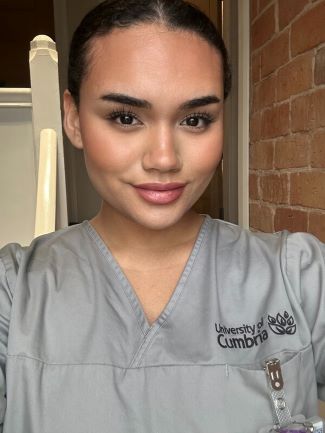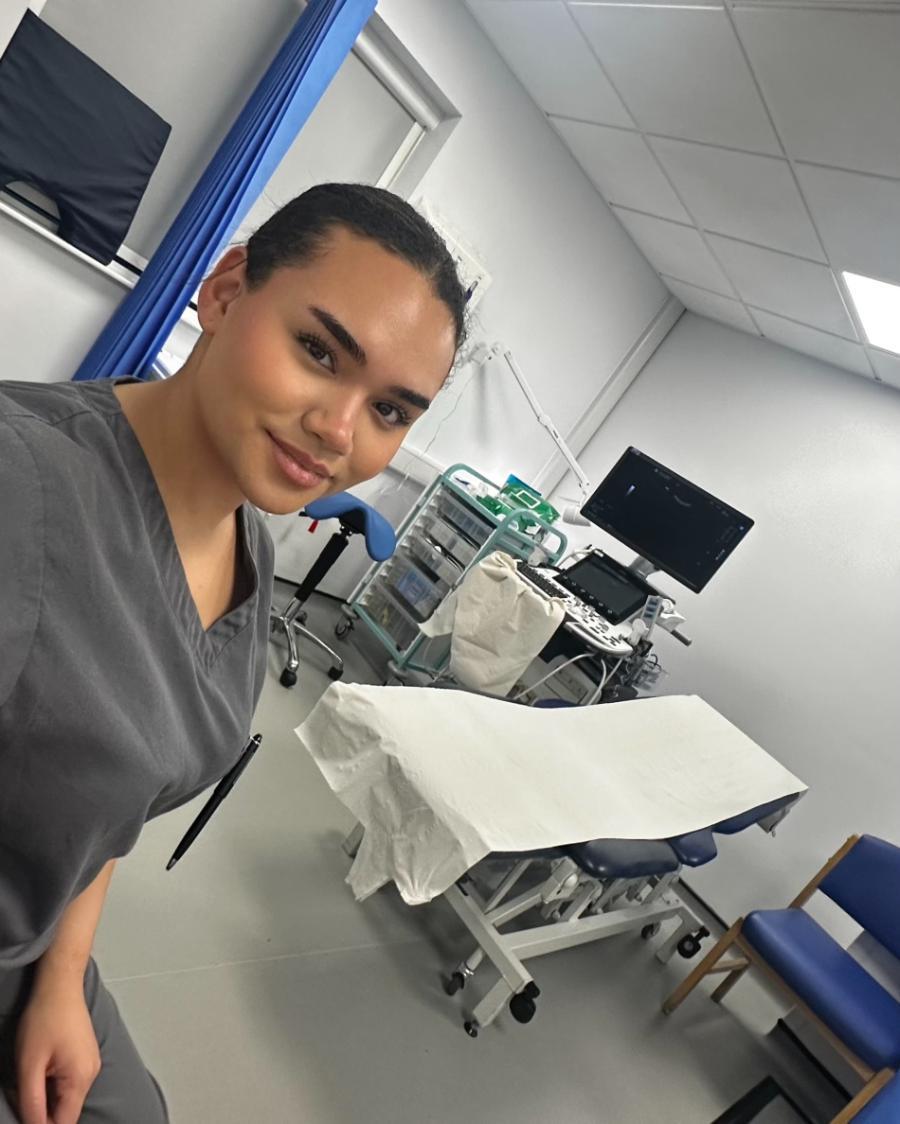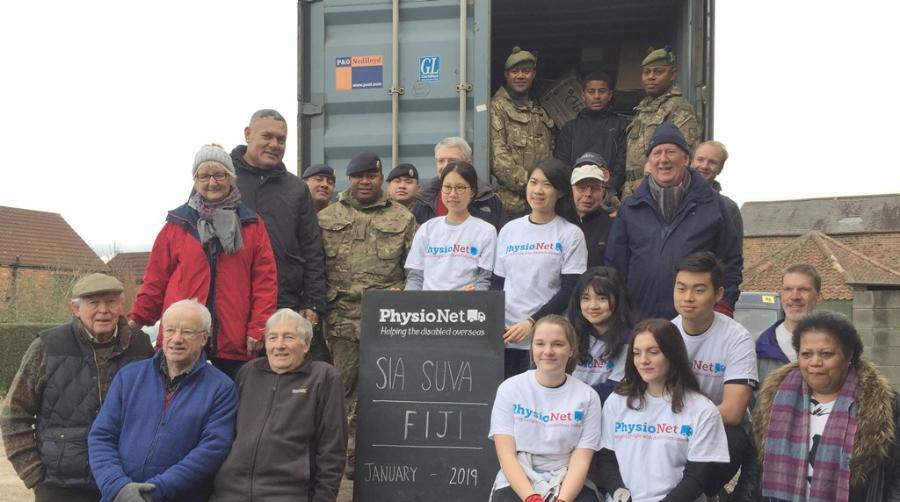

Discover Abigail’s journey to the University of Cumbria and read her top tips for applying to our BSc (Hons) Diagnostic Radiography programme.
Why did you choose to study your course? What or who inspired you?
My name is Abigail, and I am currently a second-year Diagnostic Radiography student at the University of Cumbria in Lancaster. I knew I wanted to go into healthcare as a future career but didn’t know exactly how or what path I wanted to go down. My passion for medical imaging began during my sixth-form studies when I volunteered with PhysioNet, an organisation providing mobility/ medical equipment to developing countries. Through this, I saw the impact of medical equipment shortages, particularly in my home country of Fiji, where access to essential imaging technology and specialist trained professionals is limited.
While volunteering, I helped send equipment to the Spinal Injury Association in Fiji and Harare Dawn R.C in Zimbabwe. It was here that I learned about the vital role diagnostic imaging plays in diagnosing and treating internal injuries. This experience deepened my understanding of how crucial access to imaging technology is for proper patient care.
Intrigued by this, I spent time researching the role of a radiographer and realised it was more than just pushing a button. I was drawn to the precision required to capture diagnostic images while ensuring patient comfort. I learned that radiographers play a crucial role during the diagnostic process; without them, we wouldn’t be able to capture what’s going on inside the body, from broken bones to tumours and various infections. This combination of technical skill and compassionate care confirmed for me the importance of radiographers in the healthcare system, inspiring me to pursue this career.
Why did you choose the University of Cumbria?
In many ways, the University of Cumbria chose me. As I was transferring from another institution, I faced significant challenges in finding a university that was right for me. However, from the very beginning, the University of Cumbria offered unwavering support and was able to accommodate me with ease—an act for which I will always be grateful. I quickly discovered that the university fosters a warm, positive, and collaborative learning environment. This is not only reflected in the supportive nature of my peers but also in the dedication and encouragement of the staff and lecturers.
The location in Lancaster was also ideal for me; as a commuter, the straightforward train journey is convenient, especially the easy connections to the Lake District and Morecambe. The city itself, rich in history and everything being within walking distance from restaurants, pubs and lots of little cafes and parks adds an extra layer of enjoyment to my academic experience.
How have you found your placement(s)? Where was your placement, and what was it like?
During my placements at various hospitals within the Morecambe Bay Teaching Hospitals Trust, I’ve had the opportunity to rotate through different departments, gaining exposure to a wide range of imaging modalities. I spent time in both CT and MRI, becoming familiar with the machinery and appreciating how these modalities differ from general X-ray. I also worked with portable X-ray machines in wards during night shifts and in the theatre/fluoroscopy department, assisting in medical procedures from stenting to hip replacements, where I saw first-hand how X-ray contributes to the success of these operations.

One of the most valuable aspects of my placements has been collaborating with the wider multidisciplinary team. I’ve worked closely with nurses in A&E and liaised with consultants in theatre, which has taught me how to focus on my role as a radiography student, but also how to implement imaging protocols in coordination with other healthcare professionals. Being on placement has helped me recognise how my contribution fits into the broader team dynamic and how this collaborative approach enhances patient care.
What challenges have you faced and how have you overcome them?
Throughout my journey as a student radiographer, I’ve faced several challenges that have tested my resilience and commitment to the profession, but each one has contributed to my personal growth.
One of the earliest challenges was leaving my previous university after my first year. Though difficult, this decision allowed me to reflect on my goals and well-being. I returned to Scotland where my family live and worked in a dementia care nursing home, which deepened my understanding of healthcare and strengthened my communication and confidence when working with patients with cognitive impairments.
I then applied to study radiography in Scotland, but financial barriers prevented me from continuing. Undeterred, I took a role as an imaging assistant in ultrasound in Preston, where I gained hands-on experience and assisted in ultrasound guided procedures. As much as I enjoyed this, I still wanted deep down to go back to university to finish my radiography degree.
The final challenge was finding a university that could support my academic needs. After much research, I found the University of Cumbria in Lancaster, which accepted me as a second-year student in September 2024. The welcoming and supportive environment has reignited my passion for radiography and has been key in helping me overcome past obstacles.
How have your tutors supported you during your studies?
I feel I’ve been very lucky, my tutors at the University of Cumbria and my Clinical tutor have been incredibly supportive during my studies, offering both regular academic guidance and personal encouragement. Through meetings and constructive feedback, they have helped me identify my strengths and areas for improvement. This ongoing support has enabled me to reflect on my progress and focus on developing the skills necessary to become a proficient radiographer. Their mentorship has boosted my confidence and provided me with the tools to continue growing both academically and professionally.
What would be your top tips for people thinking of doing the same course as you?
If you're considering a career in Diagnostic Radiography, my advice would be to seek out shadowing and work experience as early as possible. Gaining hands-on experience before you start your course can make a significant difference. Universities, especially for health-related programmes like radiography, value applicants who show a genuine interest in healthcare. Having concrete examples of past experiences that highlight your commitment of caring for others can be a big advantage, particularly in interviews.
For instance, before starting my course, I worked as a support worker in assisted living for individuals with brain and spinal injuries during the COVID-19 pandemic. While it wasn’t directly related to radiography, the experience was invaluable in developing skills that are transferable to any healthcare role. Being proactive about gaining practical experience will not only strengthen your application but also set you up for success once you begin your studies.
What advice or guidance do you have for people thinking about applying for university?
There are three key pieces of advice I believe you should keep in mind when applying for university:
Firstly, one piece of advice I’d offer is to always have a backup plan. The application process can feel overwhelming, and sometimes things don’t go as expected. Whether it's not meeting certain requirements or facing unexpected challenges, having a Plan B in place can ease some of that pressure.
Secondly, and equally as important, is to seek support whenever you need it. Don’t hesitate to reach out to tutors, friends, or even the university’s admissions services. They're there to help, and you'll often find others going through similar experiences, so supporting each other can make the process less daunting. University applications can be intimidating, especially the first time around, but knowing that help is available—whether it’s advice about entry requirements or guidance on personal statements—can make a big difference.
Finally, I would also recommend thoroughly researching the universities you're considering. Take the time to explore not only the course content and structure but also the placement opportunities available. Consider other factors, such as the location, campus facilities, and lifestyle outside of academics, especially if you'll be living away from home. Also, take advantage of open day opportunities to get a real feel for the area. Your university search is a two-way process—you’re not only being assessed, but you’re also choosing the institution that will best support your goals. So, don’t hesitate to ask questions and assess how each university aligns with your personal and academic needs.
What are your plans for the future, and how is your course preparing you for your potential career?
In the future, I aim to specialise in Ultrasound, and I believe my degree in Diagnostic Radiography provides a strong foundation for this career progression. The course will have equipped me with the essential clinical skills, technical knowledge, and critical thinking abilities that are fundamental not only for general radiography but also for more advanced imaging modalities like sonography.
What’s been the highlight of your time at university so far?
What has stood out most to me during my time at university so far is the experience I’ve gained on placement, particularly the opportunity to work with a diverse range of patients. Each patient presents unique challenges and interacting with people from all walks of life has enriched my learning experience, helping me improve my ability to communicate and connect emotionally with others.
No two days are ever the same and working with an array of people—regardless of their background, age, or origin—has shaped me into a more compassionate and empathetic person. Seeing the positive impact I can have on a person’s day is one of the main reasons I love what I do. It’s not just about mastering technical skills; it’s about understanding the human side of healthcare and ensuring that every patient feels seen, comfortable, and cared for throughout the imaging process. Without the patient, there is no profession.
Is there anything else that you’d like to add?
Embrace the bumps along the road, because they often bring the most valuable lessons.

